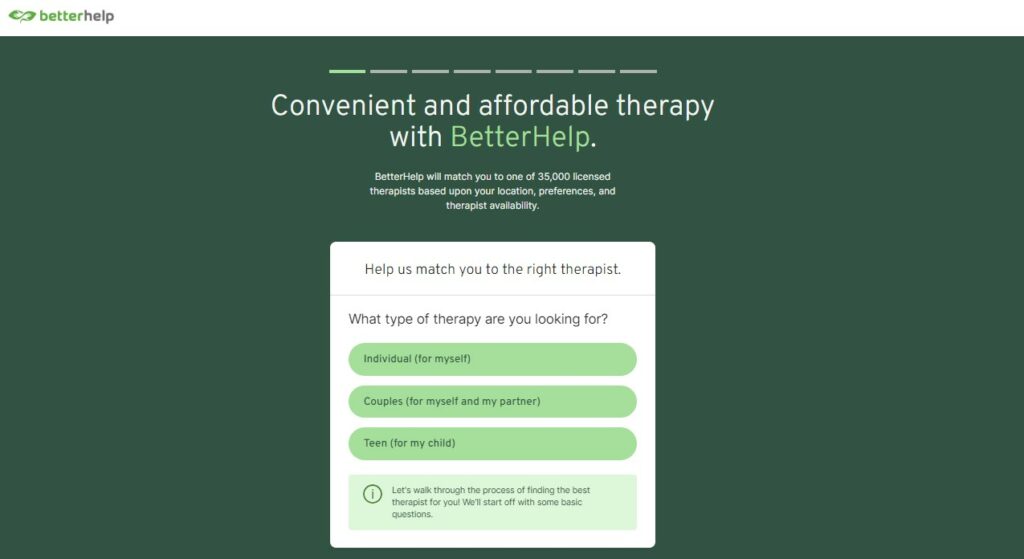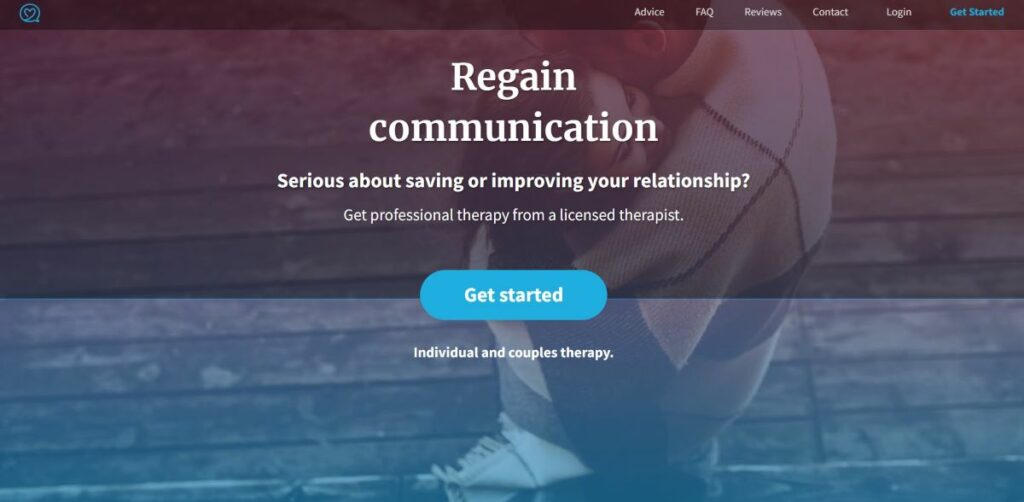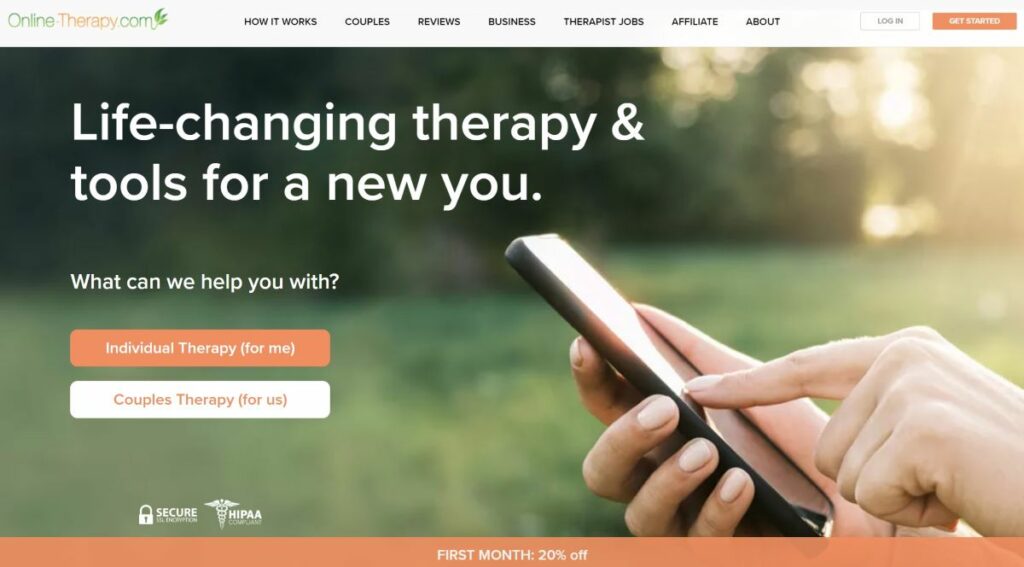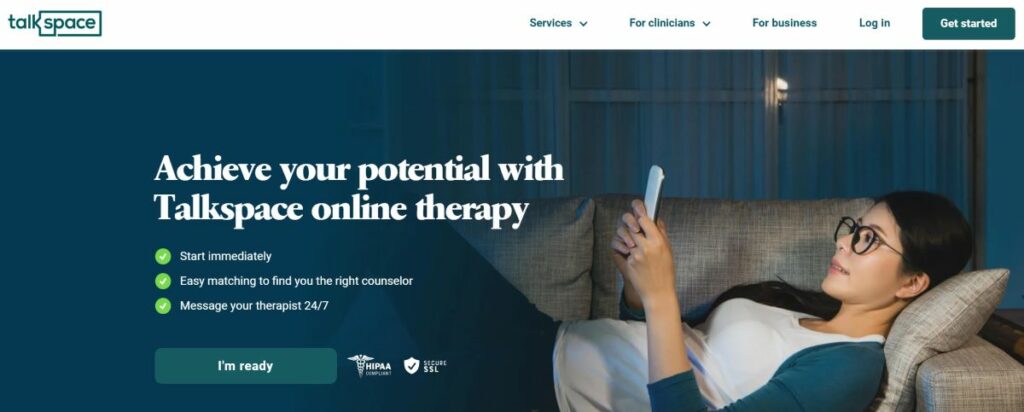FaceTime therapy is an increasingly popular option for those who are looking for more flexible, accessible, and affordable mental health services.
In this guide, we’ve reviewed seven of the best online counseling options that offer video call sessions. We’ve also discussed what you can expect from your virtual therapy experience, to help you ensure you get the right support for your specific needs.
Want to skip right to the suggestions for FaceTime therapy? Here are our 7 recommended therapy solutions:
Best FaceTime Therapy Providers
Below we’ve explored seven online providers where you can connect with licensed therapists to address different mental health issues.
| Povider | Good For | Location | Pricing |
|---|---|---|---|
| BetterHelp | Quick match with the right therapist for you | Online therapy | $65 to $90 per week (billed every 4 weeks) |
| ReGain | Quick match with the right couples therapist for you | Online therapy | $65 to $90 per week (billed every 4 weeks) |
| Teen Counseling | Teens from ages 13-19 | Online therapy | $65 to $90 per week (billed every 4 weeks) |
| Ritual | Couples guidance through proven interventions | Online service | $100 to $260 per month |
| Online-therapy.com | Finding licensed and experienced therapists with a Cognitive Behavioral Therapy (CBT) approach | Online therapy | $40/week to $88/week (including our 20% discount first month) |
| Calmerry | Depression therapy, online grief counseling, anxiety therapy, therapy for OCD, self-esteem therapy | Online therapy | $49.50 to $73.75 per week (billed monthly) |
| TalkSpace | Depression, anxiety, bipolar disorder, OCD, PTSD, LGBTQIA+ therapy | Online therapy | Varies according to insurance coverage or self-pay options |
1. BetterHelp

Explore emotional well-being with BetterHelp – your partner in affordable online therapy. With 30,000+ licensed therapists and plans starting from only $65 per week, BetterHelp makes self-care accessible to all. Complete the questionnaire to match with the right therapist.
- Good for: Quick match with the right therapist for you.
- Location: Online therapy.
- Pricing: $65 to $90 per week (billed every 4 weeks).
- Features: iOS and Android app available, message your therapist anytime, live sessions are scheduled weekly and done via live chat, phone, or video call.
BetterHelp is one of the world’s largest online therapy platforms, with over 30,000 licensed therapists and professional counselors available from around 160 different countries. With therapists in every time zone, you can book in video therapy sessions at a time that fits your schedule.
Read our BetterHelp review here.
2. ReGain

Tailored for individuals and couples navigating relationship or marital issues – ReGain is your online relationship therapy solution. Starting at $65/week, you can schedule one weekly live session and message your therapist anytime. Start your path to healthier connections with ReGain – fill out their online assessment form.
- Good for: Quick match with the right couples therapist for you.
- Location: Online therapy.
- Pricing: $65 to $90 per week (billed every 4 weeks).
- Features: iOS and Android app available, message your therapist anytime, live sessions are scheduled weekly and done via live chat, phone, or video call.
ReGain specifically focuses on relationship counseling. They offer services for individual clients, couples, and families who are looking for relationship therapy. When you sign up for ReGain, you must answer a questionnaire and then you will be matched with an appropriate therapist according to your needs and preferences.
3. Teen Counseling

Nurture your teenager’s well-being through Teen Counseling. Tailored for ages 13-19, their online therapy begins at $65/week. This includes a weekly live session, the flexibility to message your therapist at any time, and the opportunity for parents to connect with therapists. Empower your teen’s journey today with Teen Counseling – start with their online questionnaire.
Note: We collaborate with top-tier mental health companies and receive advertising fees from purchases through the Teen Counseling links.
- Good for: Teens from ages 13-19.
- Location: Online therapy.
- Pricing: $65 to $90 per week (billed every 4 weeks).
- Features: The platform is designed to make finding a therapist easy, message your therapist anytime, live sessions are scheduled weekly and done via live chat, phone, or video call.
Teen Counseling is an online therapy platform dedicated to helping those aged between 13 and 19. The website has over 9,000 quality licensed therapists available to help teens with mental health problems such as stress, anxiety, depression, bullying, anger issues, eating disorders, and relationship problems.
4. Ritual

Ritual assists you in healing and transforming relationship issues into opportunities with the aid of their experienced Relationship Experts and science-backed methods. Complete the Ritual assessment to begin rekindling your relationship with 1:1 sessions with experienced professionals, personalized in-app content, guided reflections, and activities between sessions.
- Good for: Couples guidance through proven interventions.
- Location: Online service.
- Pricing: $100 to $260 per month
- Features: 1-1 sessions with relationship experts, online activities and personalized skill-building content, option to join together as a couple or on your own.
Ritual is a service that enables you to overcome relationship struggles. This website creates tailored programs using proven interventions so you can feel seen and understood, break the cycles in your relationship, and avoid emergency situations.
5. Online-therapy.com

Discover transformative online therapy with Online-therapy.com. Through cognitive behavioral therapy (CBT), Online-therapy.com offers individual and couples support starting at $45/week. Engage in sessions via video, voice, or text for maximum flexibility. Fill out their online questionnaire to get started.
- Good for: Finding licensed and experienced therapists with a Cognitive Behavioral Therapy (CBT) approach.
- Location: Online therapy.
- Pricing: $40/week to $88/week (including our 20% discount first month).
- Features: Unlimited messaging with your therapist, including a daily journal and activity plan, yoga and meditation videos, and tests to see your progress.
Online-therapy.com is an accessible platform for individuals and couples seeking mental health support, with a focus on evidence-based interventions and personalized care. The platform offers one-on-one therapy sessions conducted online by licensed therapists trained in CBT techniques.
Read our online-therapy.com review here.
6. Calmerry

Embark on a journey of mental wellness with Calmerry. With diverse subscription options, starting at just $50, Calmerry makes prioritizing your mental health simple and accessible. You can message your therapist any day or schedule a live therapy session from the comfort of your home from any device.
- Good for: Depression therapy, online grief counseling, anxiety therapy, therapy for OCD, self-esteem therapy.
- Location: Online therapy.
- Pricing: $49.50 to $73.75 per week (billed monthly).
- Features: Message to your counselor anytime, text therapy and video therapy according to the plan you choose, free counselor switching.
Calmerry is an online platform that offers individual counseling and therapy via text message or video call according to your preferences. There you will be matched with a therapist after you complete a short questionnaire where you can express your needs.
Read our Calmerry review here.
7. TalkSpace

Tailored to individuals, couples, teens, and offering psychiatry services, Talkspace plans kick off at a wallet-friendly $69 per week. What’s more, many health insurances also cover their services, enhancing accessibility and affordability. Complete a questionnaire and get matched with the right therapist for you.
- Good for: Depression, anxiety, bipolar disorder, OCD, PTSD, LGBTQIA+ therapy.
- Location: Online therapy.
- Pricing: Varies according to insurance coverage or self-pay options.
- Features: Accepts insurance, live video sessions and unlimited messaging with your therapist, medication management.
TalkSpace offers a range of mental health services, including individual therapy, couples therapy, teen therapy, and psychiatry services. Talkspace offers several subscription plans to accommodate different needs and budgets.
Read our TalkSpace review here.
Is FaceTime Therapy HIPAA Compliant?

HIPAA (the Health Insurance Portability and Accountability Act) is a federal statute in the United States that protects the private health information of its citizens.
Because online therapy is becoming more and more popular, you might be wondering whether or not video conferencing options like FaceTime, Zoom, and Skype can keep your health information confidential.
Because of the way most video chat technology is designed, it generally does not store or maintain any of your information, including what was discussed between you and your counselor. Essentially, the technology is normally designed to be a data processor, rather than a data storage service.
However, apps such as Zoom and Skype do store some information, such as text messages between users on the platforms. Also, some apps, like Zoom, give you the option to record meetings, which can be a privacy concern.
Because FaceTime (Apple’s video call service) doesn’t record meetings, it is likely to be HIPPA compliant, although it has not been officially certified as such.
What are the Differences Between Online Therapy and Regular Therapy Sessions?

The biggest difference between online therapy and in-person therapy is how you communicate with your counselor.
While in-person therapy sessions are normally conducted in an office, virtual therapy can be done through text messaging, video chat, or phone calls. This means that with online counseling, it can be harder for mental health professionals to read your body language and facial expressions, depending on how you get in touch.
Also, online therapy relies on having a strong internet connection. If your internet connection is slow, or has poor latency, then you may face communication challenges, especially when your therapist is conducting sessions using video conferencing.
In terms of cost, traditional therapy is often more expensive than online therapy. This is because traditional therapy practices often cost more to operate. Online counseling providers don’t have the extra overhead costs that brick and mortar practices do, such as rent for an office space or salaries and benefits for their staff. However, traditional therapy often accepts insurance, while many online therapy platforms do not.
Traditional counseling typically is only available during business hours, which can make it difficult for people whose schedules don’t align with these timeframes. With virtual therapy, you can meet with counselors in a different time zone, allowing you to get help without having to take time off work. Plus, if you live in a smaller town or city and are looking for a specific type of counselor, you might be able to find a greater range of qualified mental health professionals to choose from over the internet.
Both online and in-person counseling can be incredibly beneficial for your mental health. Some people simply prefer online counseling, thanks to how accessible it is. Others prefer traditional counseling because it feels more personal. The most important thing is how comfortable you feel – you need to be able to open up to your mental health professional to give your therapy the best chance of success.
FaceTime Counseling Security Tips

Even though online counseling platforms have gone to great lengths to ensure the privacy of their users’ confidential information, there are some things you can do to help make sure your personal business stays between you and your counselor.
Firstly, do your best to make sure your meetings with your counselor are held in a private setting. Virtual therapy is great because you can do it anywhere, but keep in mind, you will probably feel most comfortable talking about personal information in a quiet space. Squeezing in a session on your lunch break might be tempting, but for privacy’s sake, it’s best done in a private space where you won’t be disturbed or overheard.
Another way to ensure your privacy is to use strong passwords and pin codes on your phone and virtual therapy accounts. Most good online platforms have high-grade encryption and firewalls in place to prevent a data breach, but increasing your password strength will provide an additional layer of security.
Using a secure, hard-to-guess password or pin code on your phone (not your birthday for example) will also help give you peace of mind about the security of your personal information.
Conclusion
Virtual therapy can be a great way to improve your mental health.
The growing number of counseling platforms available on the internet have made therapy more accessible than ever before. With the option to FaceTime, Skype or video chat your counselor, you can get help from the comfort of your own home, which can be immensely beneficial for some people.
References
Robledo Yamamoto, F., Voida, A., & Voida, S. (2021). From therapy to teletherapy: relocating mental health services online. Proceedings of the ACM on Human-Computer Interaction, 5(CSCW2), 1-30. Link.
Simpson, S., Richardson, L., Pietrabissa, G., Castelnuovo, G., & Reid, C. (2021). Videotherapy and therapeutic alliance in the age of COVID‐19. Clinical psychology & psychotherapy, 28(2), 409-421. Link.






